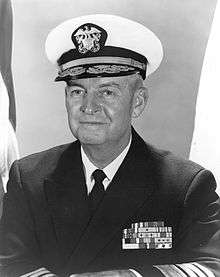U. S. Grant Sharp Jr.
| U. S. Grant Sharp Jr. | |
|---|---|
 Ulysses S. Grant Sharp, Jr. | |
| Birth name | Ulysses Simpson Grant Sharp, Jr. |
| Nickname(s) | Oley |
| Born |
April 2, 1906 Chinook, Montana |
| Died |
December 12, 2001 (aged 95) San Diego, California |
| Place of burial | Fort Rosecrans National Cemetery, San Diego, California |
| Allegiance | United States of America |
| Service/branch | United States Navy |
| Years of service | 1927-1968 |
| Rank |
|
| Commands held |
Pacific Command Pacific Fleet |
| Battles/wars |
World War II Korean War Vietnam War |
| Awards | Silver Star (2) |
Ulysses Simpson Grant Sharp, Jr. (April 2, 1906 – December 12, 2001) was a United States Navy four star admiral who served as Commander in Chief, United States Pacific Fleet (CINCPACFLT) from 1963 to 1964; and Commander-in-Chief, United States Pacific Command (CINCPAC) from 1964 to 1968. He was PACOM commander during the Gulf of Tonkin Incident. Sharp was related to Ulysses S. Grant, who married Sharp's great-aunt.[1][2]
Military career
Sharp was born in Chinook, Montana, and named for Ulysses S. Grant, who had married his father's aunt. Raised in Fort Benton, Montana,[3] he graduated from the United States Naval Academy in 1927. He is also a 1950 graduate of the Naval War College.
During World War II, he commanded the destroyer USS Boyd in the Pacific Theater, earning two Silver Stars. By the Korean War, he was commanding a destroyer squadron, assisting in the planning of the Inchon landing. He served as deputy chief of naval operations for policy and planning in the early 1960s.
After receiving his fourth star, Sharp took command of the Pacific Fleet in 1963, followed by command of Pacific Command. During his tenure, due to the Tonkin Gulf Incident, the U.S. increased its presence in Vietnam after the passage of the Gulf of Tonkin Resolution. Sharp views on U.S. strategy in the war, namely massive military action, differed sharply with the Johnson administration's preference for a gradual buildup of forces. Sharp was featured on the August 14, 1964, cover of TIME Magazine.
Post military career
After retiring from the Navy, Sharp was a critic of U.S. policy in the Vietnam War, lecturing frequently and writing articles. He wrote an article in Reader's Digest in 1969 titled We Could Have Won in Vietnam Long Ago, and in 1978 his book Strategy for Defeat: Vietnam in Retrospect[4] was published.
His first wife, Patricia, whom he married in 1930, died in 1986. In 1987 he married the former Nina Blake.
After suffering a fall in October 2001, Sharp's health steadily declined until he died on December 12, 2001, at his home in San Diego. He was buried in Fort Rosecrans National Cemetery.
He was survived by his second wife; two children, one a retired Navy Rear Admiral; a sister; four grandchildren; and eight great-grandchildren.
See also
References
- ↑ U.S. Oliver, Myrna. Grant Sharp, 95; Admiral, Vocal Critic of Vietnam Strategy Los Angeles Times, December 17, 2001.
- ↑ Christopher Marquis. Ulysses S. Grant Sharp Jr., Vietnam War Admiral, 95 New York Times obituary, December 18, 2001
- ↑ The Imperturbable Admiral, TIME Magazine August 14, 1964
- ↑ Sharp, U. S. Grant. Strategy for Defeat: Vietnam in Retrospect. San Rafael, Calif: Presidio Press, 1978.
Further reading
- Ewing, James W. Admiral Sharp, Air Power and Victory: A Critical Analysis of Strategy for Defeat, Vietnam in Retrospect, by Admiral U.S.G. Sharp, USN. Maxwell AFB, AL: Air Command and Staff College, Air University, 1988.
- Marquis, Christopher . Ulysses S. Grant Sharp Jr., Vietnam War Admiral, 95 New York Times obituary, December 18, 2001
- Moïse, Edwin E. Tonkin Gulf and the Escalation of the Vietnam War. Chapel Hill: University of North Carolina Press, 1996.
External links
Ulysses Simpson Grant Sharp, Jr Find-a-grave entry
| Military offices | ||
|---|---|---|
| Preceded by John H. Sides |
Commander in Chief of the United States Pacific Fleet September 30,1963–June 26, 1964 |
Succeeded by Thomas H. Moorer |
| Preceded by Harry D. Felt |
Commander in Chief, Pacific Command June 30, 1964–July 31, 1968 |
Succeeded by John S. McCain, Jr. |